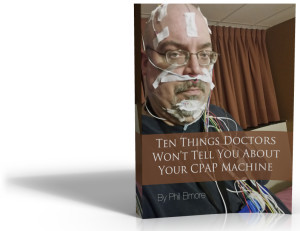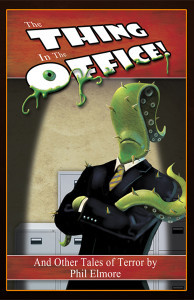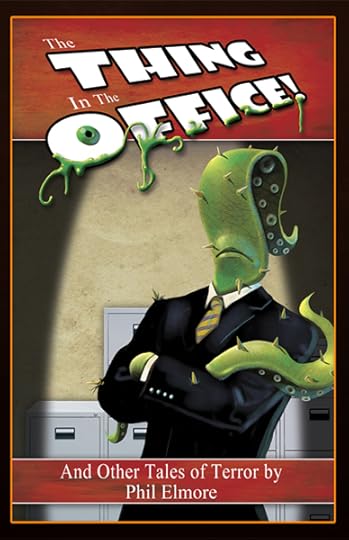Phil Elmore's Blog, page 4
October 21, 2015
Stop Giving Bad Writing Advice
One of the regrettable side effects of a world in which anyone can publish any garbage straight to Amazon is the proliferation of “indie” authors. Now, mind you, I have nothing against independent authors as such. I am and have been one of them. Then again, I have nothing against “martial artists” as such. The problem is that in a completely unregulated market, you’re going to find a lot of people who walk and talk like they’re tenth-dan masters who have no earthly clue what they’re doing. Does that last sentence refer to martial artists or indie authors?
Yes.
The driving compulsion behind most independent authors — well, behind any author — is the desire to be published. Sure, we’d like to make money at it. Every one of us dreams about making a comfortable living just sitting in a Starbucks plunking away at yet another masterpiece. We daydream about the halcyon days of bookstores; we want lines of people waiting at midnight for our next release in our bazillion-selling series. Essentially, we all want to be Stephen King or, even better, J.K. Rowling, whom I’m fairly certain could sleep in a bathtub of Krugerrands if she wanted to. It’s not about the money for most independent authors; it’s about the prestige of being able to say, “I am a published author.”
Invariably, authors start writing about writing. I resisted doing so for years. I’m firmly convinced that all authors spend entirely too much time talking about writing, writing about writing, and thinking about writing. The existence of the hashtag #amwriting bugs me to no end — because if you’re tweeting about what you “amwriting,” you sure as hell aren’t actually getting work done. I know I’ve been productive when I look up at the clock and discover a couple of hours have gone by, unnoticed, while my phone has registered several missed phone calls and text messages. If I have time to post on social media, I’m not actually getting any work done.
George R.R. Martin drives me crazy for this reason. He’s a massively successful author, but he’s said in interviews that he only works when he’s home for an extended period of time and can focus on his ancient word processor. He doesn’t work when he’s traveling. He doesn’t work when he’s going to be interrupted. Essentially, he only writes during the Winter Solstice when the moon is full and Jupiter is ascending, or some such nonsense. He’s lucky his series and the television show it spawned have made him so financially comfortable, because a working writer couldn’t afford to turn out content at that glacial pace. He’d starve first.
Tugboat Captain’s hats aside, Martin is a great writer whose success is unquestionable. He could blog about writing (if he was working on something that didn’t predate the Rubik’s Cube, I mean) and his opinion would have credibility. But we’ve reached the point where any Indie author who can construct a competent sentence figures he or she should be giving you writing advice, appearing at conventions, chairing discussions about writing, and generally playing the role of expert. I have to tell you, most — not all, but most — of the independent authors I read simply aren’t that good at writing. If they were better, they probably wouldn’t be independent authors in the first place; they’d likely have found publishing houses that would have them.
I’m very aware that are exceptions, and please don’t think I’m excepting myself. I published my worn science fiction and fantasy works back in the wild-and-crazy print-on-demand days, when you paid a company a hosting fee so they could run off copies of your overpriced trade paperback when somebody placed an order. My first books were terrible. I was very proud of them, but they were and are, well, garbage. At that stage in my career, I did not have the skill to recognize them for what they were.
There are a lot of people working to that level who are even now giving their fellow terrible independent authors advice on how to be slightly less terrible. Whether that circle of blind men is going to produce anything worthwhile is anybody’s guess. Once in a while it does, and that author will break out with a decent small-press publisher (Permuted Press comes to mind). Most of the time, though, these amateur authors crank out reams of chaff that goes straight to Amazon’s Kindle Select and stays there.
Once in a while, an indie author makes it big and gives hope to the legions of others out there. That’s a good thing, and that success means I want to hear from that guy. I’m willing to bet there are things I can learn from him. But if your only claim to fame is that you wrote a book that nobody else wanted and you gamed the Kindle promotions system to make that book a bestseller, your advice on writing is speculative at best. You’re probably not in a position to give advice if you’re still supporting yourself with a “real” job, at least not if a cursory glance through your Kindle “look inside” content reveals that you don’t actually write very well. Good writing isn’t just avoiding mistakes or knowing the rules of grammar. Good writing has to be better than trite. It has to stretch beyond derivative. It has to be more compelling than “good enough.”
If you can’t do that, sit down and shut up. Spend some time listening. Spend some time learning. And above all, spend more time writing. Stop trying to be the teacher when you’ve yet to surpass the students.
October 19, 2015
No, You Won’t Be Suing Anybody
Writers all hate each other. We’re all jealous of one another’s success and we’re all quietly convinced that another man’s paycheck comes at our expense. For most writers, there’s nothing more painful than hearing that someone like John Scalzi just signed a six-figure deal, because Scalzi’s also the sort of person who spends his time on Twitter savaging anyone to right of Mao. We all hate the thought of someone we find perfectly detestable also succeeding in the industry. It’s as if we, as writers, view all the money in the writing world as a finite pile of cash, meaning every dollar pocketed by you is one less dollar for me.
In a world where most of the participants spend more time writing about writing than they do actually producing work, it’s inevitable that writers will come into conflict with each other, flame each other, and then start to threaten each other. I’ve never heard of anyone coming to blows at an awards event, but the flap over the Sad Puppies and the Hugos probably came close to getting some people punched in the face. A lot of people online forget that there are real human beings behind the Facebook and Twitter accounts with which they argue… and if you push a man hard enough, he just might show up in your driveway with a shotgun.
It’s a wise policy to avoid picking fights with strangers on the Internet, and especially with other writers. You can’t afford to let another author live in your head, rent-free. Your readers may enjoy the heat and light of you flaming somebody on your blog, but ultimately, those kinds of antics just make you look petty. Ask yourself this: At some point, you may find yourself in a position to change jobs. You may find a new job and even announce this fact to your readership. What happens when someone you’ve been using to pump up your blog traffic takes the time to PDF your profanity-laced diatribes about him or her… and mails them to your new boss? Everything on your blog is public record. Are you truly comfortable with that idea if your financial situation changes?
The same authors who seem to delight in attacking their fellow authors, independent or otherwise, display a remarkable lack of awareness when it comes to online security. I’ve watched one indie author savagely attack a string of people who have offended him for various petty reasons… and the whole time he’s been using these attacks to fuel his blog and entertain his fans, he’s been posting pictures of his kids and family, not to mention his personal whereabouts and plans for moving and changing jobs, all over his Facebook page (as well as the blog in question). It doesn’t take a lot to lock down your Facebook page to just your friends and family, but even that is hardly Fort Knox if somebody truly takes the time to Facebook-stalk you. Stated another way, if you give someone enough reason to make you their project, they will find you. It’s just not smart to go looking for these conflicts.
Inevitably, those whose job it is (or who think their job is) to express their opinions online will run afoul of someone who wants to sue them. You, as an author, may decide that you want to sue someone yourself. Most people are happily ignorant of the law and how it works. The majority of Americans, at least, believe that at the drop of a hat, anyone in the world can sue you into poverty over almost any affront. The reality is considerably different, whether you’re suing or being sued.
It’s actually really difficult to sue someone for libel, slander, or defamation. It’s easier to go after someone for copyright violations (because that’s a clear case of intellectual property, at least most of the time), but even then, unless you’re J.K. Rowling, nobody’s going to be suing you for the content in your latest masterpiece. The worst that will happen to you when you steal copyrighted content is that somebody gets it taken down, and the most you can do to thieves who take your own property is… to get it taken down. It’s a moral victory, but it’s seldom a financial one.
If you think you’re going to sue someone for what they said on Twitter or Facebook, think again. Courts (in the United States) have ruled pretty consistently that you can say more or less what you want about someone else on social media, up to and including implied threats, based on the notion that participation in these social media networks is voluntary. There is a line you can’t cross, but it’s pretty wide. And yes, if you want to push a losing case through the courts, you could, because anybody can sue for anything… but are you made of money? Lawyers cost a lot. Most of the time, the cost of going after someone over something they said online far outweighs whatever money you might manage to recoup, and that’s if you can prove damages (which you mostly can’t).
I’ve been threatened with lawsuits more times than I can count over the course of my career, particularly as a journalist. Ninety-nine times out of a hundred, these threats are completely empty. The first step by every law office is to send a demand letter, a threat that says, “Do this or else,” or maybe, “Stop doing this or else.” Anybody can send a letter for any reason. It doesn’t have the power of law and most of the time you can ignore it. If it makes you feel better to send letters like that, I guess you can waste the money paying a lawyer to do it… but you won’t do anything but help your lawyer make his Corvette payment this month.
I remember the first time I received a letter from a law office. I had been working with a client who didn’t like having his writing criticized. He demanded his money back after I did some editing work. When I refused, he tried to extort me, telling me he would “tell the writing community” that I did poor work. When he threatened to sue, I stopped talking to him. A few weeks later, I got a letter from a law office that essentially said, “Hey, remember that guy? He wants his money. You should pay him his money or, you know. Legal stuff could happen.”
Nothing happened after that. There was no lawsuit, and he sure as hell never got any money from me. That guy online telling you to “lawyer up” is making similarly empty threats. He’s not going to be suing you, he has no case, and his threat is just that — a threat, and the most he can manage.
Now, if that disgruntled client had gone on to trash me online, there is very little chance I could sue him, either. That’s the way the world works. Unless you’re a lawyer yourself and can afford to file lawsuits on your own dime, none of us has the money to pay this I’ll-sue-you, you’ll-sue-me game. The same goes for anybody you find yourself arguing with on social media.
Before becoming snarled in all this mess, choose instead to avoid it. Don’t pick fights with people you don’t know. Don’t give in to the urge to participate in flame wars. Don’t complain that you don’t like what someone is saying to you or about you; just stop engaging with them.
Not only are these feuds and spats unnecessary, but they are also distracting, potentially stressful, and very often harmful to your career. Focus instead on productive work. You’ll be surprised just how much you can accomplish… and how little time you have for online conflict when you’ve instead got work to do.
October 16, 2015
Your “Bestseller” Won’t Make You Rich
A couple of years ago, Patrick Wensink, writing for Salon, admitted that his Amazon bestseller, Broken Piano for President, made him nothing. It didn’t make him rich. It didn’t even make him a comfortable sum in terms of a year’s income. It amounted to peanuts, to chickenfeed, to numerous other metaphors for a relatively small sum of money. Patrick had achieved the dream that so many aspiring authors hold as their all-consuming goal — to write a “bestseller” — and it made almost no difference to his financial life.
I say “financial” because to write a book that other people read makes a difference to every author. We crave others’ attention. Most of us would still write even if we lived alone trapped on a tropical island somewhere in the Pacific. That’s because we’d hold out hope that someday, someone might read our work.
A writer is a heroin addict whose “fix” is seeing his work published. Each new fix has to be bigger and come faster than the last. Often, we care more about the attention than we do about the money. That’s why many prominent authors could make more money by self-publishing directly to Amazon, but don’t: They’re addicted to the prestige, perceived or otherwise, of being repped by a “big publisher.”
Even knowing this intellectually, I am vulnerable to it emotionally. If one of the world’s major publishers walked into my office right now and told me that they could put my book in every bookstore in the United States, but that I’d make half as much money as I might make if I sold that book myself on Amazon… I’d take it. I’m not going to lie. I’d do it, and I’d tell myself I was doing it because it would help “build my reputation” or “spread the word about my work.” I’d be kidding myself, though. The decision would be made purely for the prestige. Much like Roger Ebert (who was a gifted writer) never let the world forget that he had once won the Pulitzer Prize, I’d be obnoxious about the fact that I had “made it” with a big publishing firm.
Given this vulnerability, Wensink’s tale of underwhelming enrichment should not surprise us. He writes, “Even when there’s money in writing, there’s not much money… Why didn’t I just tell my wife’s family the truth to begin with? Why don’t most authors talk about money? My theory: because it’s embarrassing.” Wensick made just $12,000 in royalties off his bestselling book, which sold about 4,000 copies. That’s not a bad payday at all, but it’s nothing that’s going to support a family. Most indie authors would be overjoyed to see that kind of return on their books, which they write in the evenings, at lunchtimes, and on weekends while working a “real” job or living off someone else.
That is another dirty little secret of the writing industry. Until you reach that top tier of successful, well-known authors, you won’t be making enough money to support yourself or a family — at least, not from writing fiction. Many successful mid-list authors, people whose names you know well and whose work you love (because it is brilliant) usually have a “real” job, or they have a spouse to support them, or they live with family members to make ends meet. That is another harsh reality of writing, just as Wensick said. You can make money at it, but you probably won’t make enough to support yourself.
A decade ago I had two books published by Paladin Press, Flashlight Fighting and Street Sword. The books saw something of a resurgence recently when the hive-mind of infotainment in popular culture took notice of them. My books were featured on the front page of Break and in a fairly prominent segment on Comedy Central’s @Midnight. A lot of authors would kill for that kind of mention (and that’s not a metaphor). Yet the amount of money I’ve made during the last ten years in royalties off those books is probably ten percent of what I made freelance editing manuscripts for Paladin. That’s right: I made more money correcting the grammar and crushing the dreams of my fellow aspiring authors than I ever made actually achieving the dream of being “published for real” in the case of those two books.
If you have thoughts of quitting your job to become a successful independent author, I definitely hope you succeed. Understand, though, that it’s much more likely you’ll toil in poverty while trying to do it. The better option is to find a way to make money from your writing — to become a working writer — while still finding the time to write what you love. Someday, perhaps, you’ll finally see that magical spark of success that lets you spend your time in Starbucks writing bestsellers that support a family or even make you wealthy.
That day is not today. Get to work.
October 7, 2015
“Peeple,” Ratings, and Online Viciousness
“…Little did I know that the author in question was an insecure psychopath who would take that single comment as a declaration of war. In the space of a week he wrote not one, but two lengthy blog posts devoted to how much he hates me — and at least one of his devoted readers opined, on Facebook, that perhaps I should be murdered. Amateur authors react this way because they’re conditioned to see the most insignificant feedback as something that threatens their livelihood and reputations. By all means, let’s apply this type of hair-trigger viciousness to all individuals everywhere, without their consent, through an app that rates them as human beings…”
Read more in my WND Technocracy column here in WND News.
October 6, 2015
What It’s Like to be a Working Writer
 I got a message from a friend and fellow author today who was curious to know how I felt about the subject of ghostwriting. I have performed extensive ghostwriting over the course of my career. Not only have I written as Don Pendleton for 22 Mack Bolan/The Executioner/Stony Man novels for Harlequin/Gold Eagle/Worldwide Library, but I’ve ghost-written numerous other works of fiction and non-fiction.
I got a message from a friend and fellow author today who was curious to know how I felt about the subject of ghostwriting. I have performed extensive ghostwriting over the course of my career. Not only have I written as Don Pendleton for 22 Mack Bolan/The Executioner/Stony Man novels for Harlequin/Gold Eagle/Worldwide Library, but I’ve ghost-written numerous other works of fiction and non-fiction.
I’ve written everything from science fiction novels to bestselling “prepper” and self-defense guides to self-help books on everything from fitness to beauty (really). All of these books were done on contract for other people, most of whom took sole credit for them. That’s the gig when you’re a ghostwriter. It doesn’t feed your ego, but it feeds your family.
In fact, if you set aside your desire, as an author, to see your name up in lights — if you establish as your goal making enough money to support yourself, rather than becoming famous for the publication of works with your name on them — you stand to earn pretty well. It’s not easy breaking into the world of working writers. You have to be willing to make sacrifices. That means writing things for money that you consider beneath you. You have to be willing to forego credit. That means the great book you just wrote will have someone else’s name on it. Most importantly, you have to be willing to work quickly. That means you can’t wait for your muse to flutter past your window; you have to meet deadlines.
I spend almost no time “writing about writing.” That’s because the lion’s share of my time is spent working to get paid. I’ve no idea what the typical indie author makes off his self-published books, but I suspect that I make more money in editing, writing website copy, penning self-help and self-defense works for Internet marketers, and writing newsletters and magazines for other people. I’ve been well off and I’ve been dirt poor; I don’t judge people by how much money they make. What I do, however, is judge myself by whether I can pay my bills. If I’m meeting my obligations and doing so off the sweat of my brain and the speed of my typing, I figure I’m doing okay.
As for whether ghostwriting hurts you as an author, there are two ways to look at that. First, you have to clarify the question you’re asking. Does ghostwriting hurt your prospects commercially, by somehow “diluting your brand” or burying your work history under other people’s pen names? I have never found that it does. If anything, establishing the fact that you’re a working writer lets people know that you’re capable of starting and finishing a project, creating a product that is actually marketable and salable. An indie author who’s typing the great American novel may or may not ever finish. It took me years to write my first novel. It took me three months to write my latest Executioner title for Harlequin, and that’s at a relaxed pace during off hours.
The other way to look at it is this: Does ghostwriting hurt your abilities as a writer? After all, writing to spec, or writing within other people’s IP constraints (or even just their preferences for the output) can be very limiting for a writer. I’ve had entire scenes that I really liked ripped apart by overzealous editors, but I wasn’t in a position to complain because the books I ghostwrite aren’t my property. When conforming to the employer’s formula, there are things you’d like to do, ways you’d like to write, that you’ll never get to do. Does operating under those sometimes stifling limits hurt your ability as a writer?
Again, I don’t find that it does. Writing other people’s work is often a chance to stretch your boundaries, to take on challenges that you would not tackle if you were writing your own stuff. There are certain genres I had never attempted until a client paid me to do it. More importantly, ghostwriting commercially forces you to face certain realities. You have never known writer’s block until you’re staring at a page on a book that was due a month ago and your editor is screaming for the manuscript. You have never known tired until the day you want nothing more in the world than to go to bed, but you can’t because you promised the client you would have 20,000 words of website content to him that evening. I have watched more late nights become early mornings than I would like to admit. I have pushed myself beyond all reasonable limits because the bills have to be paid. I have written things I didn’t want to write, and written them well, because that was the job.
That’s what being a working writer is all about. It isn’t glamorous. You don’t often get to see your name on a book cover, and when you do, that book probably won’t make you a great deal of money. You’ll spend just as much time writing things you hate as sitting in a Starbucks writing something you love. But come the first of the month there is food on the table. The car note is paid. The lights are still on. That, honestly, is the best any writer can hope to achieve.
If you’re writing, you had damned well better be writing to make money. If you aren’t, your passion is just a hobby. You don’t truly become a writer until writing is your job.
Update: Moxley returning; Knife Throwing book soon
Detective Moxley’s serial adventure will be back on track in a few weeks. I have an Executioner novel to finish for Harlequin (my 22nd) and a few other projects to mop up before I can return to catch up his adventure. My apologies for those who were enjoying him before I got off track and bogged down under more pressing obligations. Such are the trials and tribulations of a working writer.
September 30, 2015
When Parenting Online is Abusive to Children
Read my WND Technocracy column this week, “When Parenting Online is Abusive to Children,” live now in WND News.
September 29, 2015
Ten Things Doctors Won’t Tell You About Your CPAP Machine
 Millions of Americans suffer from sleep apnea. Your options, when you’re slowly dying in your sleep, are few. You can ignore the problem and continue dying; you can undergo surgery or perhaps be fitted for a mouthpiece to keep your airway open; or you can adapt to sleeping with a Continuous Positive Airway Pressure machine.
Millions of Americans suffer from sleep apnea. Your options, when you’re slowly dying in your sleep, are few. You can ignore the problem and continue dying; you can undergo surgery or perhaps be fitted for a mouthpiece to keep your airway open; or you can adapt to sleeping with a Continuous Positive Airway Pressure machine.
If you’re like me, when your doctor told you that you needed a sleep study, you weren’t thrilled. If you managed to follow up and get through the sleep study, you were even less happy when they told you that you needed CPAP therapy. You probably believe, if you’re just starting your CPAP journey, that a single night on the machine and you’ll wake up feeling better.
The reality is considerably different. CPAP therapy can save your life… but there’s a LOT you don’t know about adapting to a CPAP machine. In this book, Ten Things Doctors Won’t Tell You About Your CPAP Machine, I’ve compiled the ten things I wish somebody had bothered to tell me BEFORE I tried to adapt to CPAP. Armed with this information, you may find it easier to adapt to the machine… but you’ll also learn just why it is so important that you stop ignoring your snoring, your nighttime choking, and your obstructive sleep apnea.
Ten Things Doctors Won’t Tell You About Your CPAP Machine is a quick, easy read. It’s available for immediate download for just 99 cents in the Amazon Kindle Store.
September 21, 2015
The Thing in the Office and Other Tales of Terror
 When your boss is a man-eating plant from another galaxy, it’s normal to have a case of the Mondays. But what if your best friend thinks he can put your brain in a computer?
When your boss is a man-eating plant from another galaxy, it’s normal to have a case of the Mondays. But what if your best friend thinks he can put your brain in a computer?
What if you’ve discovered an ancient alien temple brimming with priceless artifacts?
What if you find yourself in your twilight years… only to face a horde of ravening zombies?
And does it matter if your dog or your cat talks to you in clear English, but only on Christmas Eve?
These and other questions are asked and answered in The Thing in the Office, a collection of terror, thrills, and supernatural speculation.
You can order your copy of The Thing in the Office right here at Amazon.
“I really enjoy well written short stories and all of the ones in ‘The Thing in the Office’ are incredible. Horror and Science Fiction combine to make an amazing set of stories. The ability to develop characters in the short story format is what really lets you know if the author has mastered his craft. Mr. Elmore has proven he has this ability with the stories in ‘The Thing in the Office.'” — GL Powers, verified Amazon purchaser
Coming Soon: The Thing in the Office
 We’ve all had a boss we didn’t like. We’ve all had a job we felt was sucking the life out of us. But what if it isn’t just your bad attitude? Your performance evaluation is coming up, but now it isn’t your job that’s on the line. Now it’s your very life.
We’ve all had a boss we didn’t like. We’ve all had a job we felt was sucking the life out of us. But what if it isn’t just your bad attitude? Your performance evaluation is coming up, but now it isn’t your job that’s on the line. Now it’s your very life.
What if you learned you were dying… but you just happened to know a mad scientist who could fix that little problem for you? What if you found yourself in a turn of the century mining town… only to discover zombies moaning at your front door? What if you knew vast treasures lay beyond the entrance to the temple lying before you… but to get them, you’d have to brave the inscription reading, “IT WILL EAT YOU WHEN YOU DIE” …? And what happens when Christmas comes and your border collie starts talking to you?
These and other questions are asked and answered in “The Thing in the Office and Other Tales of Terror by Phil Elmore,” available soon on an e-reader near you.




